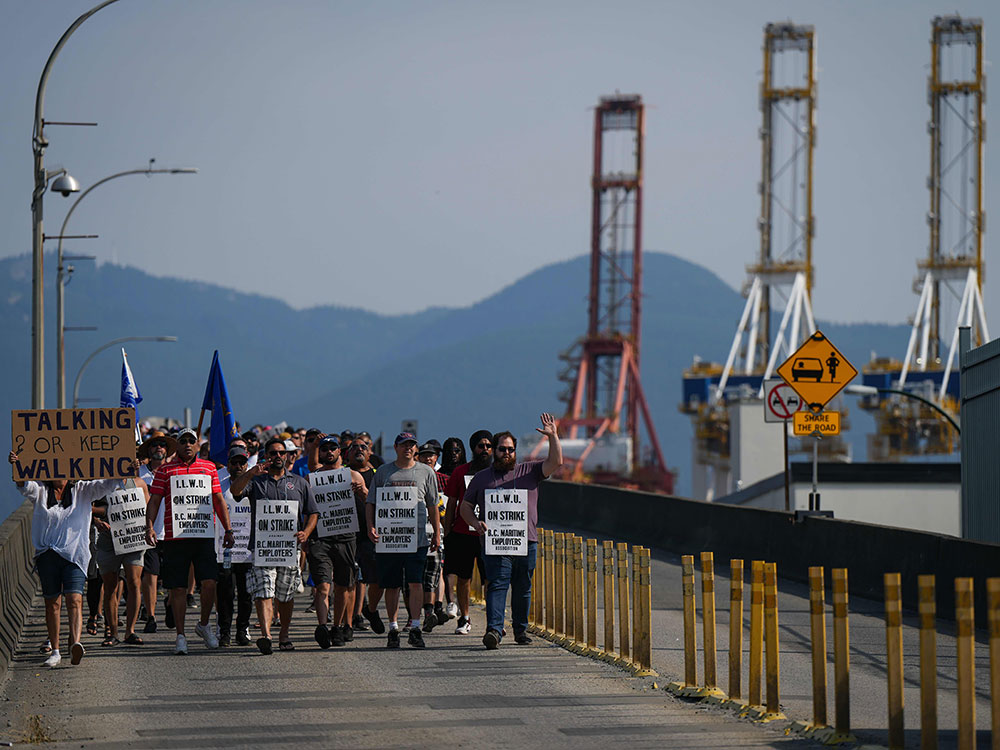Good morning, Mr. Poilievre, your mission, should you choose to accept it…
… is to make the settlement of the Vancouver port strike Thursday after less than two weeks look like a disaster for Justin Trudeau.
This will not be easy. Indeed, at this point, one might even say it’s impossible.
It seems likely, though, that federal Conservative Leader Pierre Poilievre will do his utmost to achieve the impossible.
Word of the settlement of the strike by about 7,400 longshore workers in Vancouver and other B.C. ports that began on July 1 reached Alberta just after noon on social media in the form of a tweet from federal Labour Minister Seamus O’Regan.
The tweet was linked to a short joint statement by O’Regan and Transport Minister Omar Alghabra, stating that the deal was reached at 10:20 a.m. PDT based on terms of settlement drafted by federally appointed mediators.
“We thank the Union and the Employer for their commitment to the collective bargaining process,” the statement said, a small dig at the calls throughout the strike by business groups and Conservative politicians for an immediate legislated settlement, presumably to be dictated by the port bosses. (This would have ensured months or even years of hostility on the waterfront.)
The ministers also thanked the federal mediators “for their instrumental role in supporting the parties in their negotiations and proposing the successful settlement.”
Rather graciously, the two Liberals didn’t pat themselves on the back for holding a sledgehammer over both parties if they couldn’t reach an agreement by noon Thursday.
Should he choose to try to undermine the government’s success ending the strike, Poilievre won’t be helped by the polite, and only slightly ambiguous, statement from Alberta Premier Danielle Smith.
“I am pleased to see a settlement reached,” Smith said in the first line.
“Alberta has been advocating since Day 1 for the federal government to step up and ensure a timely resolution to this strike,” her statement continued, in part. “This agreement is in the best interest of both workers and employers, and it will allow us to return to normal operations and get our product to market.”
It is not entirely clear whether Alberta’s premier was complaining that the settlement didn’t happen fast enough or whether she is genuinely congratulating Trudeau on his government’s role in the deal. It’s possible it was intended to be possible to read both ways.
As for whether the agreement is in the interests of both parties, that is something that neither Smith nor the rest of us here in Alberta yet know, since the details of the tentative agreement recommended by the mediators are for the moment known only to the negotiating parties.
As is normal in labour relations, the terms of the deal will not be made public until both parties have ratified it.
That the employer bargaining group, the BC Maritime Employers Association, will ratify the deal is probably not in any doubt, although the fact the bargaining team does not represent a single employer, but 49, raises some potentially interesting dynamics.
As for ILWU Canada, you never really know how a union workforce is going to vote on a contract ratification, but the fact members were cheerfully taking down their picket lines Thursday and getting ready to go back to work suggests they’ll ratify the deal too.
“I want to recognize the efforts of the federal government and thank them for advancing their authority under the Canada Labour Code,” Smith concluded her message, sounding uncharacteristically gracious.
If Poilievre wants to make something of the 13 days the strike took to resolve, he’ll also not be helped by his own record cheering on the border blockades by far-right insurrectionists in January and February 2022, and personally delivering coffee and doughnuts to the thugs occupying Ottawa.
Those events, of course, cost the Canadian economy quite a bit of money too — although there’s been some interesting journalistic inflation regarding the supposed cost of the B.C. port strike, estimated by the usual suspects at $500 million a day for the first part of the strike, but raised to $785 million a day, a figure attributed to the Vancouver port authority, Smith’s statement. By last night the Globe and Mail was reporting the sum at $800 million a day. One imagines someone will be claiming it was $1 billion a day before the end of next week.
Regardless, so far, at least, Poilievre seems to have wisely chosen to exercise his right to remain silent about the port strike, although he was complaining about a lot of other stuff on social media yesterday.
As a Conservative leader, he must be aware, that, as always, should he or any of his supporters be made to look foolish by voters, the party will soon disavow any knowledge of their actions. ![]()
Read more: Rights + Justice, Federal Politics, Labour + Industry, Alberta

















Tyee Commenting Guidelines
Comments that violate guidelines risk being deleted, and violations may result in a temporary or permanent user ban. Maintain the spirit of good conversation to stay in the discussion and be patient with moderators. Comments are reviewed regularly but not in real time.
Do:
Do not: